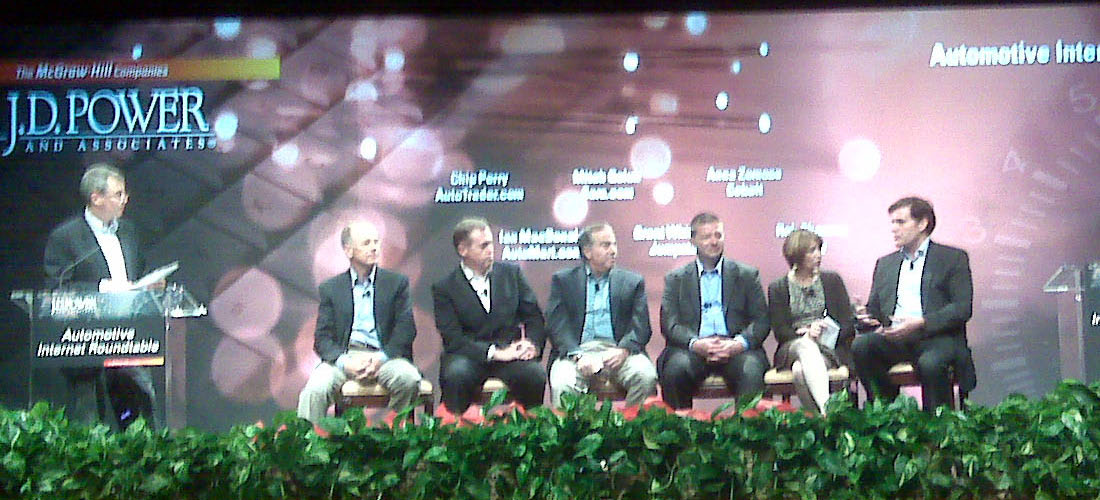J.D. Power and Associates’ annual Automotive Internet Roundtable is being held in Las Vegas, amid an industry that is being especially hard hit by the credit industry. A bunch of dealers at breakfast this morning estimated that “90 percent to 95 percent” of their sales are made on credit, and not much is going through right now. Sales themselves have shifted dramatically with gas prices, with cars — especially low-margin compacts — now outselling high-margin pickup trucks by a substantial amount.
J.D. Power VP Gene Cameron put a positive light on the situation. “It is a good thing when a tribe gathers when there is stress in the culture. We have some stress, don’t we?”
The tough times could augur well for the more efficient marketing power of the Internet, and mobile. Or it could go the other way, as many dealers still think of the Internet mostly in terms of buying leads — and not always very good ones at that. One dealer told me he is cutting back his leads, and finding newspapers and TV more attractive again — especially as other dealers drop out. He says he gets more attention with less clutter, and can negotiate better deals.
J.D. Power itself has concluded that dealers are “reining in” online spending, in line with other cutbacks. But certainly, the Internet is not just going away. In fact, its growth marches on. Every sign here is that the Internet — an umbrella term for third-party sites, portals, OEM (manufacturer) sites, paid search and lead providers and e-mail — is now an entrenched part of the auto ecosystem.
Most importantly, J.D. Power says the use of the Internet in car shopping has hit 75 percent of all shoppers — the biggest leap ever, with a 5 percent boost from 2007. “Finding the right vehicle is more important than the right price,” notes Cameron. Mobile also grew this year, with 18 percent now using mobile to look up auto information in some form — especially for luxury brands.
The bigger question for the 800 dealers and OEMs registered for this event is: What works on the Internet? Ratings and reviews are generally cited. J.D. Power says 63 percent of car shoppers are accessing vehicle ratings, and 38 percent are checking out dealer ratings. What doesn’t work, however, are request for quotes, whose use among shoppers is down from 31 percent in 2007 to 28 percent.
“The system is broken and shoppers know it,” says Cameron. According to J.D. Power’s stats, 50 percent don’t want to be contacted, and 29 percent say the information they get is not accurate.
Alternatives to lead submissions are emerging. Anna Zornosa, executive VP and GM of Cobalt’s Dealix, says its Dealer Select platform adds phone numbers and other pertinent information to let shoppers make their own connection. “A certain type of new car buyer likes that approach,” she says, noting that the 30 percent who submit RFQs may be in the minority but they aren’t peanuts. “It represents another channel.”
“Whatever you do — shopping or browsing — you devalue other activities,” she points out.
Cars.com, meanwhile, continues to deemphasize leads and focus more on content. “A lead is sold three to four times,” says CEO Mitch Golub. But with Cars.com’s site for new cars, a lead is sold only once. “The business model needs to sort themselves out,” he says. He especially expressed interest in mobile, noting that 30 percent of visitors to Cars.com’s mobile site are new to the company.
AutoTrader.com has traditionally staked out a position as leading advocate against paid leads. “The biggest thing people want is inventory,” says CEO Chip Perry, and this is borne out by J.D. Power stats.
It never changes. “In 1998, 80 percent of people picked up the phone or visited,” says Perry. “In 2008, 80 percent of people pick up the phone, do e-mail or visit,” he says. “That doesn’t argue for pay-per-call or pay-per-click. It argues for a subscription-based model.”
But on the dealer and OEM side, there is more confidence in leads, via search, as part of the solution. GM has enlisted 6,000 dealers with Cobalt for “trickle-down paid search” coming from the OEM and dealer association level to dealers. Toyota has done the same in partnership with DoubleClick.
“Same-store leads are up significantly,” notes GM VP Ed Vogt.


This Post Has 0 Comments